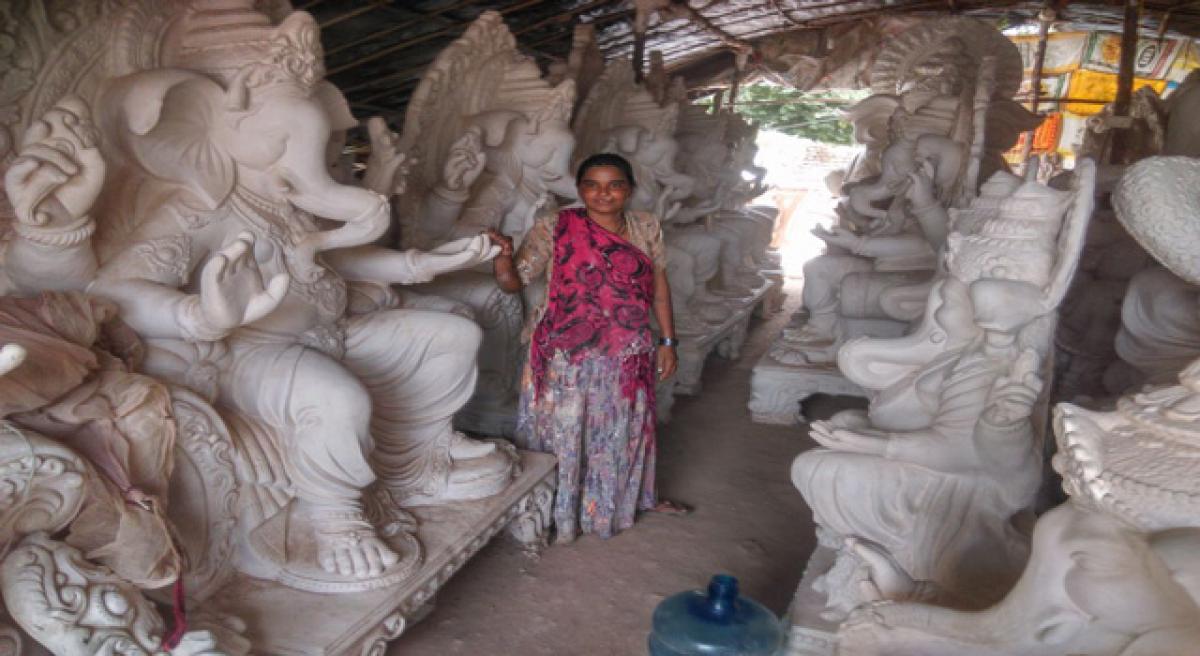Live
- Former SC judge V. Ramasubramanian appointed as NHRC Chairperson
- Shyam Benegal: A true inspiration for aspiring film-makers
- Heavy snow forecast in Japan through Tuesday
- Legendary film-maker Shyam Benegal is no more
- Hackers steal over $12.7 billion in over 1,000 crypto heists to date
- BGT: 'Rohit is short of confidence with self-doubts', opines Manjrekar
- Gold gains 30 pc in 2024, silver 35 pc up on COMEX this year: MOFSL
- Delhi HC dismisses anticipatory bail plea of ex-IAS trainee officer Puja Khedkar
- Untouched Goa Beaches You Must Visit in January
- Muzigal launches its State-of-the-art Music Academy in Nallagandla, Hyderabad
Just In

When you are in a ‘flow’, as some psychologists say, your dedication, zeal and passion will put a lid on all your miseries so that what remains out there is sheer excellence of work. This is particularly true in the case of Shanti, an idol maker from Rajasthan.
Kakinada: When you are in a ‘flow’, as some psychologists say, your dedication, zeal and passion will put a lid on all your miseries so that what remains out there is sheer excellence of work. This is particularly true in the case of Shanti, an idol maker from Rajasthan.
They don't have clean water to drink, no shelter; yet, Shanti is very determined and wedded to her craft of creating Plaster of Paris (PoP) idols as her means of livelihood.
Living on the dusty roadside, this mother of a little child is painting idols. Her concentration is like that of an ace archer who is aiming at the bull's eye. Her hand moves with extreme skill and precision as she draws complex strokes on the idol on which she has spent hours.
Wearing a fading lehenga-kurti, a typical Rajasthani dress, Shanti and her sister’s daughter give the finishing touch before they put the idols for sale. When she’s finished, the PoP idol is ready for sale. They are all placed alongside many of the other beautiful, shiny Ganesh idols, which would eventually find their way to buyers and devotees.
Every Hindu across the country prepares to celebrate Ganesh Chaturthi – worshipping and celebrating the clay idols in their homes, at temples and important junctions across the cities with the help of Utsav Committees for 10 days.
The devotees worship the idols with kudumus, modaks, sweets, gifts and flowers. It is a different matter that the skilled artisans making those Ganeshas, Krishnas and Lakshmis struggle to meet even their bare necessities daily.
Shanti came to Pithapuram, more than a year ago with her mother Boori and two children in search of a better market for her idols. They have been living on the roadside ever since, trying to squeeze into spaces between the idols of gods they create in different shapes and sizes.
The idols are sheltered under a tent. For Shanti and her family, art is worship. These idols are her only means of earning. This is an age-old tradition started by her forefathers. Today she is a proud mother and hopes her children would be willing to carry the legacy forward.
Most people usually buy these idols during the festive season, with each deity having a season of their own, depending on the festival at hand. Shanti caters to all. From Goddess Lakshmi on Diwali, Lord Shiva on Shivratri, Radha Kishan on Krishnastami to this elephant-head Ganapati for Ganesh Chaturthi, the gods change, the seasons change, but it is continual work and struggle for this small family.
Idols are priced between Rs 200 and Rs 9,000. After much bargaining with buyers, they earn little profits with no chance of saving for the future. “It is said that Ganesh comes for 10 days as the people celebrate “Navratri” and takes away all the sorrow from your life along with him during immersion.
I have lot of Ganeshas here, but never have my problems been solved, even a little,” says Shanti, reflectively; her sunburnt skin shimmering with tiny specks of silver filings from the paint she has been handling. During the festive season, she manages to sell five to six idols a day; on other days, probably it is not even one.
Wistfully, she says it would have been time-saving and beneficial if they could make the idols themselves using casts. We invest on these idols with loans from private money lenders and the sales are not good here at Pithapuram.
Don't know how to repay the loans? The cost of PoP has gone up and the transportation expenses too have been hiked up a lot, Shanti points out. But due to lack of sufficient water, they are constrained to get raw idols transported from Ahmedabad in Gujarat which jacks up costs, barely leaving them with any earning.
But despite the poverty and hardship, what shines through is their determination to continue making idols, generation after generation. Shanti and her family are not interested in any other kind of work; they want to continue the legacy of making idols and take great pride in making them.
Shanti regrets not being able to send her girl child to school; not because she wants them to find a job or choose a different means of living, but because they can then become entrepreneurs and support their family tradition of idol making.
“I wish the government supports us and sanctions a house site as well as a ration card. It would make a lot of difference to our lives. I wish I had sent my kid to school, and then we would have expanded our exhibition and would have had a better lifestyle,” says Shanti, a businesswoman in her own right.
By Peri Srikanth

© 2024 Hyderabad Media House Limited/The Hans India. All rights reserved. Powered by hocalwire.com







